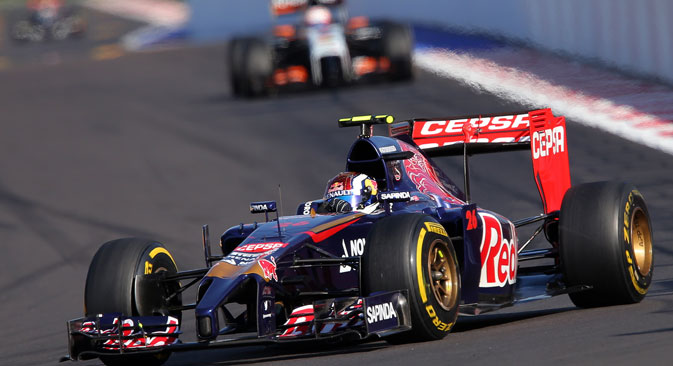
Kvyat in Sochi. Source: Vitaliy Beloysov / RIA Novosti
Daniil Kvyat doesn’t look like a star of the racetrack. When he walks into a room, his small stature and slim build resemble a jockey rather than a man who wrestles 600-horsepower beasts around tight turns.
At 20, Kvyat’s boyish features and shy smile allow him to pass for three or four years younger. His hesitant way of speaking, combined with his precise English, Italian and Russian, is more talented young student of languages than global celebrity.
But Kvyat is already a Formula One star, and on October 12 he was the main attraction for fans in his home country, as the only Russian on the grid for the first Russian Grand Prix at the Sochi Autodrom.
In the qualifier Kvyat shone, flying around Sochi’s Winter Olympic venues to secure fifth on the grid for the following day’s race. Afterwards, visibly struggling to contain his emotions, he insisted he’d won nothing yet, that the real race was tomorrow.
Those proved to be prescient words. Kvyat endured a miserable race, dropping two positions at the start and clearly struggling as he dropped down the field, eventually trailing in 14th. As President Vladimir Putin congratulated winner Lewis Hamilton on the podium, Kvyat was nowhere to be seen.
Kvyat had already celebrated a triumph the week before the race, when he was confirmed to be moving to Red Bull for next season, replacing four-time champion Sebastian Vettel, who has signed for Ferrari.
With Red Bull, Kvyat will join the sport’s elite. Red Bull won the constructors’ championship every year from 2010 to last year and, although the team has been eclipsed by Mercedes this season (which won this year’s constructors’ championship in Sochi), any Red Bull driver is guaranteed to be among the leaders next season.
Signing for Red Bull is a huge achievement for Kvyat. He arrived at March’s season-opening race in Melbourne as a relative unknown, despite being last year’s champion in the lower-level GP3 series. He announced his arrival with a ninth-place finish for two points in his debut race for Toro Rosso, Red Bull’s junior team, and finished in the points in four other races so far, a very respectable record for a rookie.
However, when Vettel decided the time had come to jump ship from Red Bull to Ferrari, few would have seen Kvyat as the replacement for the four-time world champion. After all, the Russian’s points tally was less than half that of his French teammate Jean-Éric Vergne, so was Kvyat as stunned as many fans were? Not at all.
“No, I’m not surprised,” he told reporters. “I will do my absolute best to keep the team’s name high, my name high, our name high. It will be interesting.”
His target will be to emulate the Australian Daniel Ricciardo, who moved from Toro Rosso to Red Bull in the winter and has since won three races to take third place in the championship.
Kvyat remains in his current seat with Toro Rosso until the end of this season. While he may not have had the race pace in Sochi, his showing in qualifying was a hint of great things to come at next year’s Russian Grand Prix. After all, Kvyat already has experience of winning at home. In 2012, when the Moscow Raceway circuit opened, he shrugged off pressure from the home crowd to win both his races in the Renault Eurocup series to a rapturous reception.
In his first year in F1, Kvyat has attracted attention not just for his smooth yet aggressive driving style, but also for his surname, which has presented a few TV commentators with a challenge. The standard response is to go for a version of “Kuh-veeat”, or even a three-syllable “Ki-vi-yat” (the correct Russian pronunciation is a brisk, one-syllable Kvyat). As for his first name, in the world of F1, Daniil has universally become Dany.
Kvyat’s race in Sochi was more than a little different to his first visit to the Black Sea resort. That was back in 2005, when the then 11-year-old Kvyat won a junior karting race in driving snow.
After the Japanese Grand Prix at Suzuka ended with Marussia driver Jules Bianchi in hospital with head injuries following a crash, Sochi was under immense safety scrutiny, but passed with flying colours, albeit in a race with very few dangerous incidents.
For F1 drivers, the injury to Bianchi made the results of the Japanese Grand Prix fade into the background – the thrill of victory disappearing sharply amid worry for a colleague, a fellow professional taking severe risks in the pursuit of success. Kvyat’s response was typical: “The only important thing this evening is that I hope Bianchi will be OK.”
It was a softly spoken, measured contribution, but in that moment, Kvyat was every inch an F1 driver.
All rights reserved by Rossiyskaya Gazeta.
Subscribe
to our newsletter!
Get the week's best stories straight to your inbox